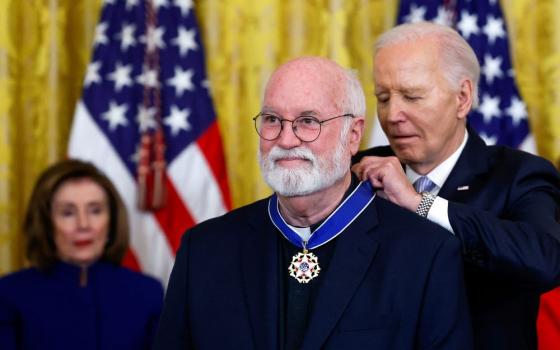The Democrats have gathered in the City of Brotherly Love for their convention. As one Church op joked with me yesterday, "Are the Democrats trolling Archbishop Chaput?" Eight years ago, they met in Denver to nominate Barack Obama, and +Chaput was still the archbishop of that city. Now he is in Philly, where the Dems will nominate Hillary Clinton as their nominee for the presidency, the first time a woman has achieved this distinction. No, there is no plot to torment the archbishop, but there will be some story lines to look for this week.
First, how will they calibrate the fear factor? Last week, in Cleveland, the Republicans sowed as much fear as they could, recounting all the evil they could find, and there is always plenty in this vale of tears if you are looking for it. Terrorism at home and abroad, a sluggish economy, bad trade deals that export jobs, corruption (petty and grand) in our governing classes, racial tensions, police shootings -- all were used to paint a dystopian vision of America. The antidote to the misery? Elect Trump, although the Republicans missed the opportunity to explain in detail, to paint the picture, of how a Trump presidency would heal what ails America, they merely asserted it would happen. People need stories if you expect them to remember something, and the GOP offered no stories, no policies, no nothing for anyone to hang their hopes on, which is why so many analysts and reporters focused exclusively on the negativity coming from the rostrum.
The challenge for the Democrats is different. People are still anxious about the economy and about terrorism. They do get nervous when they see police killing unarmed people in the streets and when they see police getting killed in response. Obama's "no drama" approach has the statistics on his side, but people are not moved by statistics. The Democrats need to flesh out both the successes of the past eight years and the challenges that remain, in personal terms, with stories to which people can connect and which will make sense of the statistics.
The Democrats need to acknowledge the anxieties people feel, but unlike the Republicans, they need to highlight the evidence of resilience and perseverance and the different ways that, working together, Americans can improve the country's future prospects. Most especially, they cannot let the fear of Trump dominate everything else. It is important to warn people about what a Trump presidency would look like. But it is more important, not only for winning the election but also for winning it in such a way that Clinton has a shot at effective governing, that the Democrats define the three or four top policy goals they seek to achieve if they win, so that they can claim a mandate to move on those policies after the election. These should be specific goals, in part to contrast with the lack of specifics on display last week in Cleveland. The top priority must be comprehensive immigration reform.
Second, and picking up from the last point, the Democrats need to remind all Americans that if your name starts with "Mc" or if it ends in "ski" your ancestors were not Native Americans. There have always been a variety of languages spoken on the streets of America. Hint to convention organizers: You can still find some neighborhoods in Philly where Italian is spoken as easily as English, and it would not be a bad idea to do some interviews in one of those neighborhoods. I'm just sayin' ... as my favorite Philly Italian likes to say. Vice presidential nominee Tim Kaine can speak fluently in Spanish and should do so, and one of the things he should say in an English-speaking interview is that Philadelphia is home to the Shrine of St. John Neumann, who served as fourth bishop of the city -- and who was born in Bohemia. Maybe go to Mass at that shrine.
Kaine's ability to speak Spanish was on full display in Miami Saturday when he appeared for the first time with Secretary Clinton as her running mate. He dropped it into his speech with ease. It was not forced. It is hard to explain what an asset this is, especially in the next three months. Compared to African Americans or white Americans, Latinos tend not to be as likely to be registered to vote and, consequently, they are underrepresented on election day. The key is for Kaine to take to the airwaves of Spanish radio and television and encourage people to register. If every Latino who was eligible to vote got registered and voted, Georgia would be purple, Arizona would be blue, and Texas would start turning magenta.
The easiest Latinos to register are Puerto Ricans, hundreds of thousands of whom have fled the island during its economic crisis. Puerto Ricans are already citizens, so they just need to show up with ID to register. Most Puerto Ricans relocated to central Florida. Obama won Florida in 2012 by a margin of only 74,000 votes. It is almost impossible for Donald Trump to win the presidency unless he flips Florida. Another somewhat unlikely landing spot for large numbers of Puerto Ricans is Lancaster, Penn., home of the Amish. One summer, about 15 years ago, I had occasion to drive through that area several times, and there were some great Boricua radio stations and some great restaurants serving pio nonos, mofongo, and pernil. Who knew? Pennsylvania has not been close in recent years, but if Trump gets a higher turnout among non-college whites in the center of the state, Clinton and Kaine can pad their numbers with the Puerto Rican vote in Lancaster. Also, Sen. Kaine should become up to speed on the crisis in Puerto Rico if he is not already.
Third, how much will the candidates' faith be a part of the discussion this week? It was striking how Sen. Kaine referred to his faith as his "North Star" and "organizing principle," and, not in an abstract way, but as something that began with his parents, was nurtured at Rockhurst, a Jesuit high school in Kansas City, and came to fruition in the Jesuit Volunteer Corps. Later in his talk, he spoke about how his faith informed his public policy pursuits, both as a lawyer and later as a politician. It has been a long time since we have heard any politician, but especially a Democrat, be so forthcoming about the role of faith in his life.
What is more, he used it to discuss Hillary's faith. If you hear a Christian talking about faith causing them to be devoted to social justice, and you know nothing else about them, your best bet is that they are a Catholic or a Methodist, right? There are plenty of Lutherans and Calvinists and others who are committed to social justice, but the Methodist tradition and the Catholic tradition are the two traditions for which is it central and defining. Polls have shown that weekly church attendees, normally a very conservative and Republican demographic, have deep reservations about Trump. Small wonder. Interestingly, among white evangelicals, Trump has closed the gap. But, can Clinton and Kaine shave off 5 or even t10 percentage points among weekly church attendees among mainstream Protestants and white Catholics? If so, they are headed for a landslide.
The Washington Post had a headline proclaiming Tim Kaine a "Pope Francis Catholic." The author of that headline was overreaching, although the article made important points. I think we can safely guess that Pope Francis would not have 100 percent voting record from NARAL. Kaine's empathy, so evident and so obviously a part of why he is so well liked on both sides of the partisan aisle may or may not reach to the unborn, but his Catholic faith calls him to that. I understand and sympathize with the demands of politics. But we should all be looking for signs that he is advising Clinton that the Democrats embrace of the culture war issues as the most important issues has a downside, and that many, many Democrats, even some pro-choice Democrats, are morally uncomfortable with abortion.
Fourth, and following on this last point, to whom are they talking and are they using the language of the D.C. interest groups or of the normal people whose votes they need? If Republicans last week mistakenly decided to speak to their base, Democrats tend to indulge a slightly different pathology, the inability to recognize that the people with whom they interact in political campaigns do not think and speak like average voters.
Nowhere is this pathology more in evidence than when the issue turns to abortion. The Democratic platform pledges the party will overturn the Hyde Amendment. As Michael Wear and Russell Moore point out in this article at USAToday, the Hyde Amendment captures the sentiment of millions of Americans that abortion is a morally fraught issue and that if the grounds for making it legal have to do with privacy, the grounds for public funding evaporate. More importantly, the Hyde Amendment already makes exceptions for the life of the mother, incest and rape; that is, it prohibits federal funds for elective abortions. Yet, the women's groups have been pushing the party to ignore the moral consensus on Hyde that has lasted since 1977 and which continues to garner the support of four in five Americans. Will the Democrats listen to the activists in Washington, whose primary concern is always to take stances and push for results that will help them with their donors, or will the Democrats stand with the American people on Hyde the way they do on common sense gun control legislation?
The changes in the platform are part of a deeper and more pernicious problem the Democrats face: Liberal activists are, increasingly, not very liberal. They sneer at First Amendment concerns for free speech and religious freedom. In the name of equality, they demand conformity to their preferred moral framework. It is not libertarianism, per se, but a perverse marriage of libertarian moral sensibilities with the application of public power. Just the other day, Clinton made fun of the Republicans for booing the proposition that voters should vote their conscience, but do you think she will defend conscience rights in Philadelphia? And the activists who think in this illiberal manner are drawn from the same intellectual and cultural milieu as the people who will staff an administration. I do not expect Clinton to issue a heartfelt appeal for the rights of conscience, and not when it is cheap, against one's opponents, but when it is hard and angers your base. But, she can temper the issue and decline to embrace the activist left's calls to use the federal government to stymie diversity and enforce their moral preferences.
Those are the things I will be focusing on this week. The Democrats in Philadelphia will likely not be as entertaining as the Republicans were in Cleveland, but for those of us who care about social justice, there are some choices to be made in Philadelphia that will promise good or ill in the years ahead.
[Michael Sean Winters is NCR Washington columnist and a visiting fellow at Catholic University's Institute for Policy Research and Catholic Studies.]








